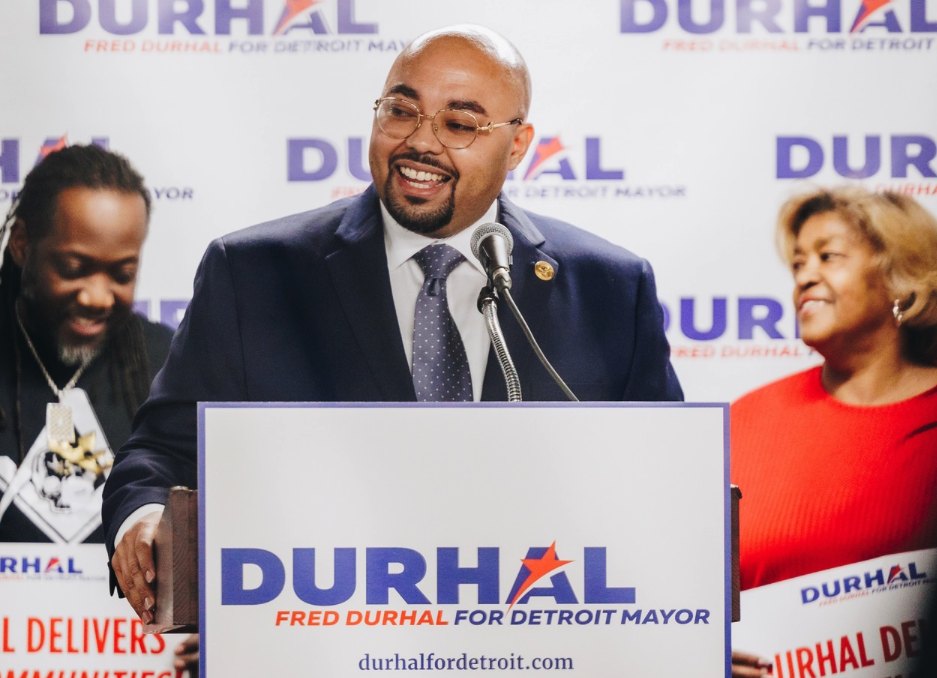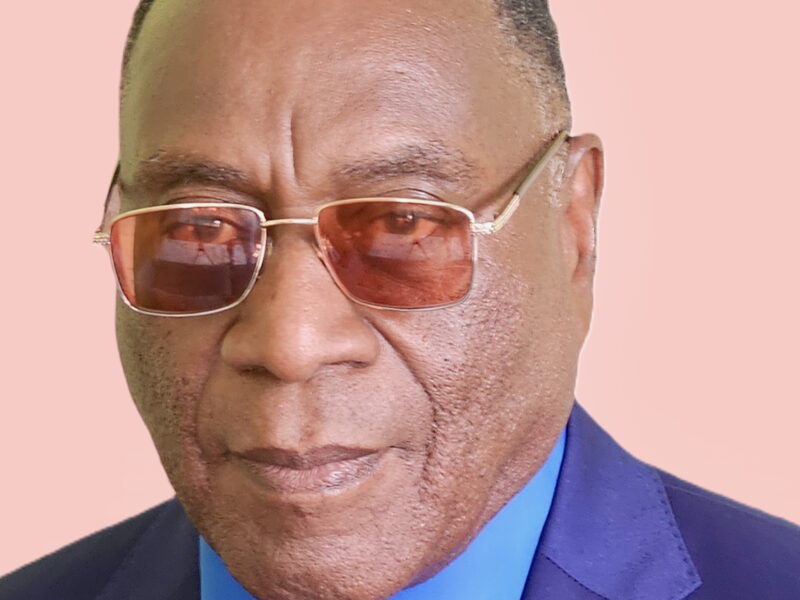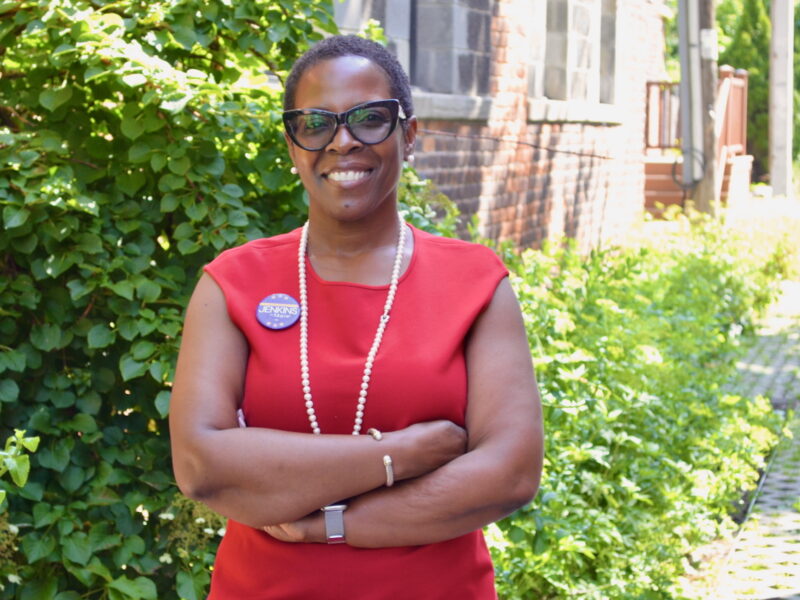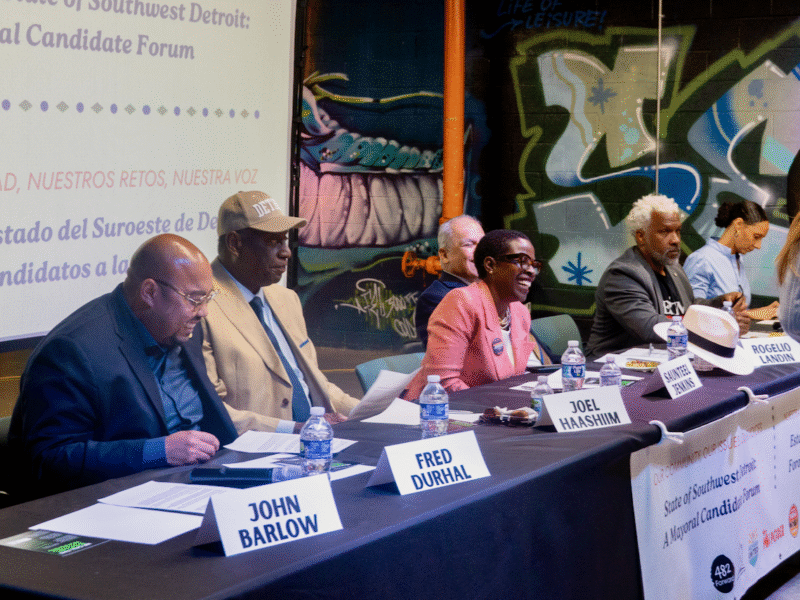Overview:
-Detroit City Councilmember Fred Durhal III represented the polluted 48217 zip code while in the state House.
-He remembers residents answering the door wearing respirators or masks.
-Durhal says he's in favor of rezoning areas of the city to less industrial uses.
Detroit mayoral candidate Fred Durhal III was elected to city council in 2021, representing District 7.
His résumé includes two terms in the Michigan House of Representatives to which he was elected in 2014 and 2016. Durhal served as assistant House Democratic leader in Lansing and served on the House Appropriations Committee.
After leaving the state House, he worked as community liaison for the Michigan State Housing Development Authority.
Durhal spoke with Planet Detroit about environmental and public health issues in the city ahead of the Tuesday, Aug. 5 primary election. This interview has been edited for brevity and clarity.
How would you balance economic development with environmental impact, for example with a project like the Stellantis plant opened under Mayor Duggan, which created new air pollution issues for east side residents?
The balance between economic development and environmental impact is “very sensitive,” Durhal said.
“Obviously, we want to do everything that we can to grow the city, ensuring that residents have jobs, have the ability to actually stay in those communities that they live in, and continue to support their families. But for projects that particularly are industrial in nature, we have to be very sensitive to the health as well as the environment, air quality issues, water quality, soil quality of what these projects may bring,” the city councilmember said.
If a development triggers a community benefits process, Durhal said environmental resources need to be included, giving the examples of air filters and frequent testing in the impacted area.
What is your stance on the air quality in Detroit as it pertains to cumulative impact? I’m thinking about residents in Delray and Southwest, for example, where it’s an issue of the ultimate effect of all of the facilities in one area.
Durhal represented the environmentally burdened 48217 zip code while in the state Legislature.
“I remember knocking doors when I was running for the state House and had difficulty breathing when I was knocking doors,” Durhal said, adding that many residents answered the door wearing respirators or masks.
The city must do everything it can to ensure it has “good actors” in industrialized areas that are meeting emissions standards, and work with the state to increase those standards, he said.
Durhal supports the fugitive dust ordinance passed by council as well as the truck route ordinance that’s in progress, he said, “depending on what’s in the language.”
In addition to providing resident protections and meeting with corporations operating in Detroit, Durhal said he favors rezoning areas of the city from M4, or intensive industrial use, to M2, a restricted industrial district, when possible, and being mindful of development near residential areas.
What role does the city play as the EPA rolls back pollution standards?
While these standards are set by the federal government, the mayor’s role is “to use our pulpit,” Durhal said, and collaborate with Michigan’s Congressional delegation.
“Although we don’t make that decision, we can utilize our voice to make sure our residents are not impacted.”
What is your stance on urban agriculture and composting? Would you support a new composting ordinance that allows standalone operations?
Detroit City Councilmember Scott Benson is a staunch advocate of composting, Durhal said, adding that he learned more about the subject from his colleague.
“What we need to do is actually put that out there to our residents, educate them more on the benefits of composting — how great it is for our environment.”
Urban agriculture “provides a benefit for the community,” he said, indicating his full support.
What would your approach be to Detroit’s Office of Sustainability and how it’s funded?
“I worked to increase the funding we have,” Durhal said, calling the city’s Chief Strategy Officer Trisha Stein “absolutely amazing.” He highlighted the passage of an ordinance for electric vehicle charging stations across the city.
“We want to continue to fund the Office of Sustainability and increase the funding to ensure that we are we are looking at our city for the future and not just right now — that we are addressing the real issue of climate here and doing everything we need to do in our power to make sure that we are as sustainable as possible.”
How would you address Detroit’s growing flooding problem? What can the mayor do to help?
Detroit needs more retention ponds, more reservoirs, more pumps, and upgraded infrastructure, Durahl said: “It’s going to take a lot of funding to be able to do that.”
Some parts of the city still have wood pipes underground, and some water mains are “desperately” in need of an upgrade, he said.
“As mayor, I’ll be very aggressive on getting dollars and funding to fix our broken infrastructure, because we kind of kicked the can down the road too long, and that is not any fault of the current administration,” he said. “We’re looking at a problem that is over 50 or 60 years old.”
What is your stance on ICE enforcement in Detroit and the city’s friendliness to immigrants?
“My position on ICE and immigration is that we are not utilizing DPD to deport people,” Durhal said.
“We have a very talented, trained police force who’s very connected to the community, and we are going to have them focusing on keeping the residents of our city safe, not doing the bidding of ICE, which is a federal department. That is their responsibility.”
The councilmember referenced the city’s Office of Immigrant Affairs and said the city would do a better job under his leadership of providing liaisons to Detroiters who may be living in the country without permission.
“Oftentimes, folks who are immigrants in our community and who may be undocumented, they live in fear each and every day, even to get resources such as help from our water department when there’s a flood, such as calling the police, because they fear deportation,” Durhal said.
“We want to ensure that we’re not only saying that we’re saying that we’re a welcoming city, but folks actually feel that way and feel that they can trust us and still have the ability to not be ripped apart from their families.”
What is your stance on Detroit’s new rental inspection ordinance and its visual-only lead inspections?
Durhal voted yes on the city’s new rental ordinance in October. It’s been criticized by some lead experts, he said, “but we also want to find a way to continue to get these inspections and make sure that they happen, that we are not overloaded with inspections.”
The ordinance streamlines the rental certificate process while maintaining strict lead standards, he said. “The intent was to kind of speed up the process, but still ensure that folks are being held compliant.”
MORE FROM PLANET DETROIT
‘Detroit needs to take its water back’: Mayoral candidate Joel Haashiim on utility shutoffs
Detroit mayoral candidate Joel Haashiim talks pollution enforcement, utility shutoffs, flooding, why he opposes neighborhood solar developments, and more with Planet Detroit.
Detroit mayoral candidate Saunteel Jenkins says she’ll work for city’s most vulnerable
Detroit mayoral candidate Saunteel Jenkins talks environmental impact, utility affordability, public transit, public health, ICE, the Office of Sustainability, and the tree canopy with Planet Detroit.
Southwest Detroit mayoral forum highlights public health, immigration
Southwest Detroit residents raise ongoing issues from February’s water main break and health impacts from truck traffic. Candidates promise action to help an area they say has been neglected.
As federal funding cuts impact addiction and mental health services, how would you address and fund public health services?
“We will be focused on utilizing our budget in any way to fill gaps where we can without exacerbating our budget,” Durhal said.
The councilmember said he would be vocal in Washington, D.C. about the need for addiction and mental health dollars and how the funds help Detroiters.
How can the mayor improve Detroit’s public transit?
The budget for the Detroit Department of Transportation should be doubled by 2030, Durhal said.
He would improve bus routes to make them fast and efficient, he said. Drivers need higher, competitive pay, and more buses need to be put on the road, the councilmember said.
Detroit should also invest in other modes of transportation such as scooters and bike lanes, he said.
Durhal said he supports regional transit, specifically rail lines on main thoroughfares that lead to other counties: Michigan, Gratiot, Woodward, and Grand River avenues. Walkable communities and public transit are a “great investment” for the environment, residents, and small businesses, he said.





